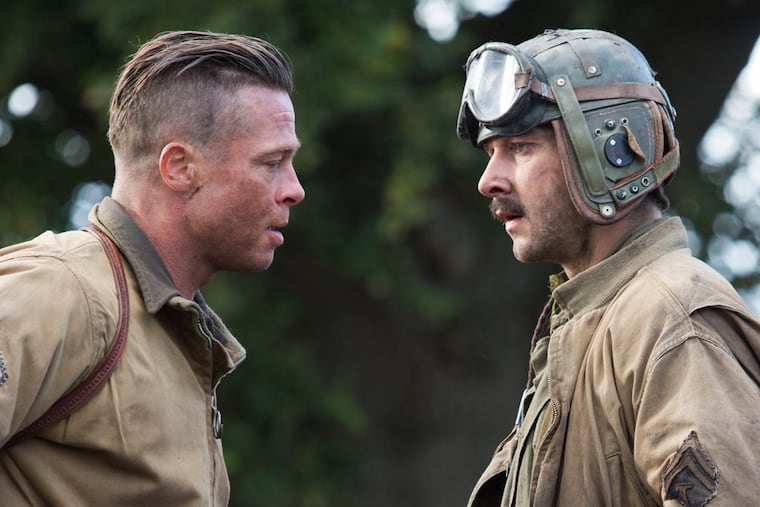Brad Pitt leads a WWII tank crew in 'Fury'
"Fury" is the violent, literally visceral story of a tank crew (led by Brad Pitt) on what amounts to a suicide mission at the close of WWII.

FULL DISCLOSURE: I spend a lot of time watching "Greatest Tank Battles" on AHC.
No more than 10 hours a week, though.
No wait, more like 15.
OK, 20.
And I can quit anytime I want.
Maybe next week. This week I have "Fury," the (literally) eye-popping World War II movie about a tank crew on a suicide mission.
It's written and directed by David Ayer, who's apparently a bit of a wild man - he encourages his cast to do a little light sparring before work. That's how he ended up smashing Jon Bernthal's nose while shooting "Fury," prompting producers to issue the "Anchorman" like caveat - no touching of the face or hair - when star Brad Pitt came on set.
He's known for the high energy, honest pulp of "Training Day" and "Street Kings," so you wonder what he'd bring to the modern war movie, territory mined so well by Spielberg ("Saving Private Ryan"), Ridley Scott ("Black Hawk Down") and Peter Berg ("Lone Survivor").
There are differences - Ayer has a heightened, hyperviolent style, and his scenes land like roundhouse punches - but some unexpected similarities as well.
"Fury" shares with these other noteworthy combat movies a focus on men who suspect they may not survive. We may as a nation be 10-1 when it comes to war, as Bill Murray asserts in "Stripes," but our contemporary movies tend to focus on loss, sacrifice, hopeless missions against long odds.
In "Fury," Pitt plays a savagely paternal sergeant named Don Collier (with the weird hip-hop nickname "Wardaddy") who's sworn to get his men through the war alive. The crew comprises a Mexican-American machine gunner (Michael Pena) a religious cannon operator (Shia LaBeouf) and a munitions man (Bernthal) of pure appetite and id.
Collier's just lost his crew's second machine gunner, and is trying to break in terrified replacement Norman (Logan Lerman). It's not working. The new guy entered the war as a typist, and doesn't have the stomach for combat (you may not have the stomach to watch him clean out his predecessor's remains from the tank).
Norman freezes under pressure when he first encounters the enemy - and no wonder, they're young German boys, thrown into the futile end of the war by Hitler's fanatics.
This leads to the movie's most startling scene - Collier forces Norman to kill by ordering him to shoot a German prisoner.
Here's a major departure from "Saving Private Ryan," which showed the execution of prisoners, but through the eyes of a disapproving hero, played by Ethical American Everyman Tom Hanks.
Ayer forces the issue - there's no buffer between the viewer and the murder. Ayer then does something truly strange - in the very next sequence, he has Collier procure a German girl for Norman, making the lurid association between losing one's "virginity" on the battlefield and in the bedroom.
There may be things Ayer lacks as filmmaker - nerve isn't one of them.
One reason there really is no one like Ayer in movies today. The closest thing to "Fury," in terms of tone and temperament, is Sam Fuller's "Big Red One," to which this movie pays obvious homage.
But, of course, Fuller served in World War II and so did his leading man Lee Marvin, so both were in a unique position to deliver what Fuller described as "fictional life plus factual death."
Ayer, a former serviceman who made the movie to understand the wartime service of his father and uncles, is working at a remove, and he's working with Pitt, who brings with him some of the baggage of "Inglourious Basterds" and it's winking, post-modern insincerity.
Ayer is nothing if not sincere, and uses his visceral, expressionist style to get at something he believes to be truthful about the nature of wartime sacrifice.
In the course of "Fury," we come to see that Collier will not keep his promise to his men - that few, if any, will survive.
Still, the men joke, in turn, that serving in a tank crew is "the best job I've had." It so happens the job is to kill, and also, almost certainly, to die.
"Fury," endeavors to show just how strange and awful that job must be.